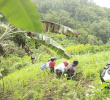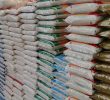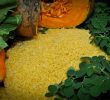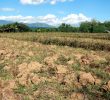The Italian government granted the country’s PHP 2.5 Billion-worth of soft loan with 0.15 percent interest per annum to develop the 35 agrarian reform communities not only in the ARMM but also in the Soccsksargen region covering 53,000 households and 31,500 agrarian reform beneficiaries.
By MARILOU AGUIRRE-TUBURAN
Davao Today
DAVAO CITY, Philippines – The Department of Agrarian Reform (DAR) and the Autonomous Region in Muslim Mindanao (ARMM) have inked a Memorandum of Agreement (MOA) to finally start the project for the development of agrarian reform communities (ARCs) in the region’s Maguindanao and Lanao del Sur provinces.
The project, according to DAR Secretary Virgilio de los Reyes, was funded by the Italian Government which aims to increase and stabilize income and improve access to key services of Agrarian Reform Beneficiaries (ARBs).
“The reason why they are chosen is because there are many ARBs there. We don’t make any distinction in the area, whether they are fisherfolks, indigenous peoples or what. We look at the impact on the community,” Delos Reyes said after the MOA signing February 1 at the Grand Men Seng Hotel.
The Italian government granted the country’s PHP 2.5 Billion-worth of soft loan with 0.15 percent interest per annum to develop the 35 ARCs not only in the ARMM region but also in Soccsksargen covering 53,000 households and 31,500 ARBs.
“This is the government’s assistance for the farmer-beneficiaries. It’s a soft loan. They won’t be paying any amortization,” said ARMM Officer-in-charge Governor Mujiv Hataman.
In Maguindanao, the project covers Datu Montawal’s Tungol ARC; Datu Piang’s Kabalukan; North Upi’s Tinungkaan; SK Pendatu’s Alamada cluster; and still an unidentified ARC in Sultan Mastura.
In Lanao del Sur, the project sites are Wao’s Milaya ARC; Bubong’s Carigongan; Kapatagan’s Sultan Barudi Bansil; Balindong’s Dado and Malabang’s Diamaru.
“What’s good with this project is that within the community, it’s not only the ARBs who will benefit. It’s extended to non-ARBs as well like upland farmers,” said Ma. Marcy Ballesteros, DAR’s National Project Coordinator for the Italian Assistance to Agrarian Reform Communities Development Support Program.
The Italian grant will also be poured in Sultan Kudarat’s Cotabato City and the municipalities of Lambayong, Lutayan, Esperanza, Isulan, Tacurong, Kalamansig, Lebak and Pres. Quirino.
In Sarangani, the project will be implemented in Gen. Santos City and the municipalities of Alabel, Glan, Kiamba, Maitum, Malapatan and Malungon.
“Before the implementation, we must insure that the baseline data are already in place so that we will know if the area is ready and if there’s a concrete partnership among the local government units,” Delos Reyes said.
He clarified that the project will look at “the local markets and economy” and that there is no condition to sell or export the products to Italy.
Lawyer Aquino Sajili, DAR-ARMM secretary, said the focus of the project is product development noting that many ARCs and ARBs do not have this yet.
The project has four components namely agricultural and enterprise development, local capacity building support, community infrastructure development support and program management.
The first component aims to increase and stabilize production, develop new market opportunities, promote use of improved technologies, improve crop diversification and create new entrepreneurial activities according to farmers’ needs. The second aims to improve rural development services in support of the decentralized government line agencies and raise the competitiveness of agriculture sector through the effective and stronger farmers’ organizations. The third component aims to provide production, access and basic social services infrastructures. And the fourth aims to provide support to project supervision, administration, monitoring and evaluation to effectively implement the project.
“This will really help our ARCs and ARBs. At the very least, the rehabilitation of the farm-to-market roads will greatly help our farmers,” Hataman said. (Marilou Aguirre-Tuburan/davaotoday.com)










